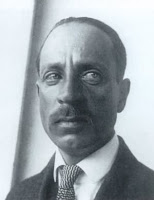Similar to Terry Maker’s inspiration from John Milton’s Paradise Lost, current temporary exhibition artist Scott Johnson draws from a variety of literary sources for his artistic inspiration. Here are some of the artist’s favorite snippets from various books and poems.
 |
| Rainer Maria Rilke (image source). |
“For beauty is nothing but the beginning of terror, which we still are just able to endure, and we are so awed because it serenely disdains to annihilate us.”
“But what most puzzled and confounded you was a long, limber, portentous, black mass of something hovering in the centre of the picture… A boggy, soggy, squitchy picture truly, enough to drive a nervous man distracted. Yet was there a sort of indefinite, half-attained, unimaginable sublimity about it that fairly froze you to it, till you involuntarily took an oath with yourself to find out what that marvellous painting meant… But stop; does it not bear a faint resemblance to… even the great leviathan himself?”
“His visionary sketch of the habitat for postmodern humans recalls us to the elemental relationship we have to the earth, to its place within the cosmos, and to previous human cultures who have understood, so well, the limits of human powers. This is the vision of tragic man.”


